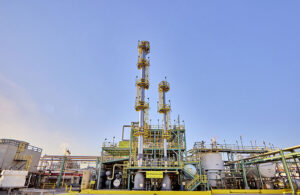 The international industrial conglomerate Honeywell (Nasdaq: HON) has opened a facility in Baton Rouge, Louisiana, to produce its new Solstice Air (HFO-1234ze(E) cGMP) medical propellant.
The international industrial conglomerate Honeywell (Nasdaq: HON) has opened a facility in Baton Rouge, Louisiana, to produce its new Solstice Air (HFO-1234ze(E) cGMP) medical propellant.
HFO-1234ze is a fourth-generation refrigerant.
The Morris Plains, New Jersey–based company says the new medical propellant has near-zero global warming potential (GWP) and is suitable for use in respiratory inhalers.
The Solstice Air product is exempt from federal volatile organic compound (VOC) requirements.
Honeywell has announced that its client AstraZeneca (LON:AZN) is working on using Honeywell’s Solstice Air technology as a medical propellant in its triple-combination therapy Breztri Aerosphere (budesonide/glycopyrronium/ formoterol fumarate).

Honewell plant in Baton Rouge [Image courtesy of Honeywell]
FDA approved Breztri Aerosphere as a maintenance treatment for COPD in 2020.
Honeywell notes that Solstice Air has up to 99.9% less GWP than current propellants in inhaled respiratory medicines.
AstraZeneca expects their triple-combination therapy Breztri Aerosphere (budesonide/ glycopyrronium/ formoterol fumarate) to be the first medicine to transition to the next-generation propellant, subject to regulatory approval, followed by the rest of their pMDI portfolio.
“Through close collaboration and extensive knowledge sharing between [Honeywell and AstraZeneca], we are committed to bringing the next generation of inhaled medicines with near-zero GWP propellant to patients,” said Pablo Panella, senior vice president of global respiratory and immunology at AstraZeneca. “Honeywell’s ability to escalate the production of Solstice Air at their new manufacturing site will help enable us to move quickly on this ambition once regulatory approval is achieved.”
Honeywell has committed to carbon neutrality in facilities and operations by 2035.
AstraZeneca aims to eliminate emissions by 2025 and to become carbon negative by 2030. Astra announced in a press release that it would spend $1 billion on a range of initiatives, including the launch of next-generation respiratory inhalers.
Honeywell notes that it has spent more than $1 billion in R&D and additional capacity to manufacture its Solstice technology.
Outside of medical inhalers, the line of Solstice technology is suited for refrigerant use in vehicle air conditioning, supermarkets and propellants for consumer use, among others.